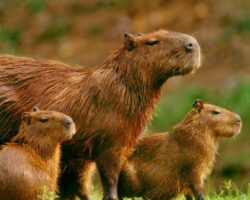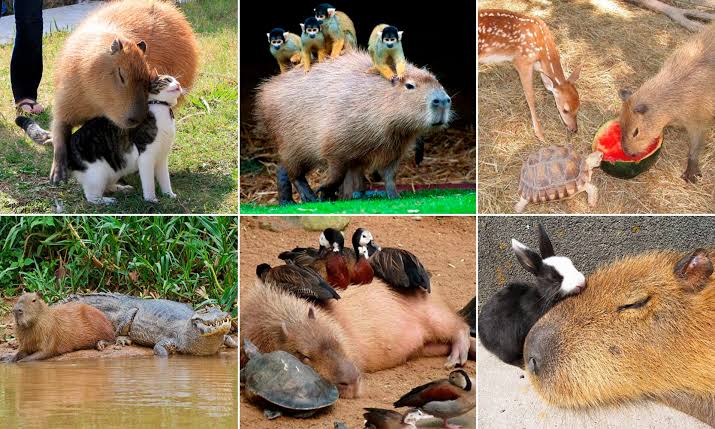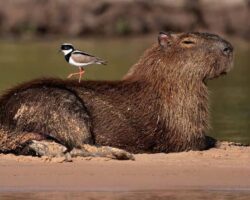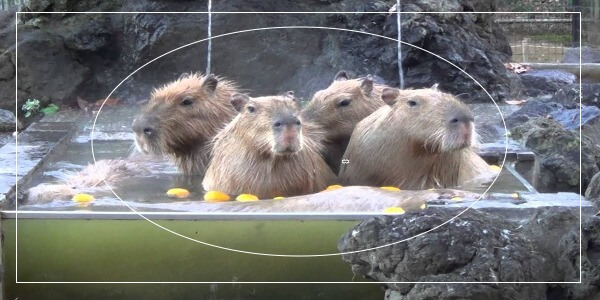Capybaras are cute and cuddly but don’t always act like it. These semi-aquatic rodents are commonly found in South American countries such as Costa Rica, Argentina, Venezuela, Brazil, and others.
One of the surprising facts about capybaras is that they poop in the water! Also, they eat food that’s been soaked in water, but they also eat foods that have been dried out by humans or other animals (like seeds), which means there’s no need to spray their waste around as dogs do.
But what else do capybaras have in common with dogs?
Capybaras are known for their swimming abilities and do much business in the water. They poop a lot; in this article, we will uncover some facts about capybara poop.
Let’s dive into the science of why these creatures poop where they do.
What Does Capybara Poop Look Like?
Capybara poop takes the shape of pellets, which can be brown or black. When the capybara’s poop comes out in black or brown color, it shows their diet is rich in nutrients, but if it comes out in a sausage-like form, it shows the capybara isn’t fed a good diet.
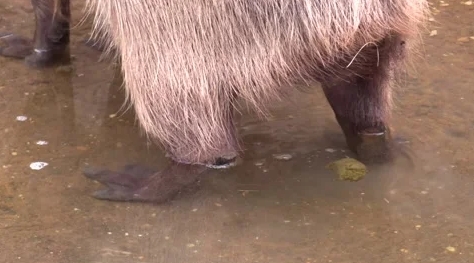
How Do Capybaras Poop?
Capybara has an opening in their hindquarters that lets them pass excreta and waste. To eject poop, they lower their butt and allow it to drop.
The digestive system of a capybara is comprised of the following:
- Stomach.
- Esophagus.
- Cecum.
- Small intestine.
- Colon.
- Rectum.
- Anus.
Once a capybara consumes its meal, its digestive system processes the food. While the digestible substances are retained in the body, the indigestible substances are ejected through the anus.
It is widely believed capybaras poop a lot as they consume a lot of food. However, this shouldn’t be a problem for capybara owners as their poop isn’t smelly, and the rodent takes to the water to excrete its waste.
Does Capybara Poop Smell?
If you are considering adopting a Capybara, you may want to know if the scent of their poop is offensive. Generally, capybara poop doesn’t stink, and this is why many people would like to have them in their homes.
Although their poop smells, it isn’t odoriferous for your home. In fact, the capybara poop doesn’t smell like dog feces, which can leave a pungent smell in your apartment.
Where Do Capybaras Poop?
Capybaras are the largest rodents, so it’s expected they do most of their activities on land. However, they are semi-aquatic animals, which lets them get in a pool of water whenever they feel like.
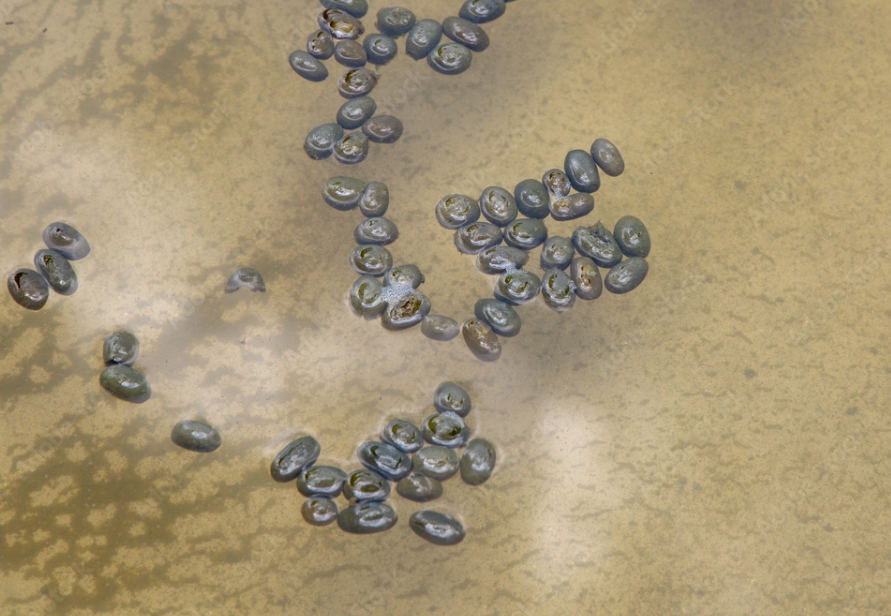
Capybaras typically get into a pool of water to defecate. Many people believe they do this for protective reasons – to conceal themselves from lurking predators.
If you want to adopt a capybara or already have one, consider getting a bowl of water to let your pet capybara poop in. If you have a large yard, you can construct a small poop where they can poop in.
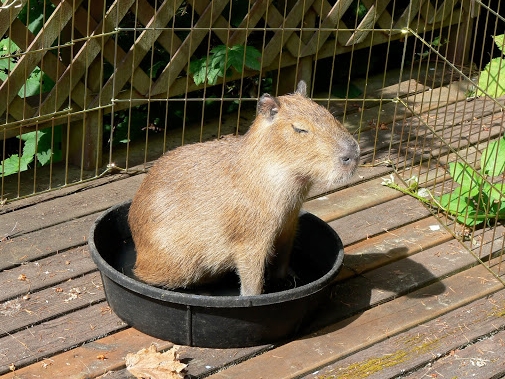
Capybaras can also poop on grass if the area is safe. Moreover, capybaras can fart like humans do. Capybaras may fart due to the accumulation of gas in their internal digestive organs. They are comfortable farting in a pool of water.
Why Does Capybara Spend So Much Time In Water?
If you’ve ever observed a capybara in the wild, you’ll have noticed that they’re semi-aquatic. They spend most of their time in or near water, using it to stay cool and dry off after swimming around in it.
The reason why capybaras spend so much time in or near water is that they are lazy! They don’t need to eat as much food as other animals do—they can get all the nutrients they need from natural sources like plants and bugs.
These creatures only want to chill out on a nice warm bank with some leafy greens nearby (or, if you’re feeling fancy: grass).
1. It keeps predators from smelling them far away.
It’s important to know that the capybara can escape predators by hiding in the water. The capybara’s nose is not sensitive enough for it to smell them, so they can get away from their enemies easily.
However, this has its downsides: if you want your pets as pets and not just food sources (or if you want them somewhere else), keeping them in a tank may be more trouble than it’s worth!
2. It makes sure their fur doesn’t get wet.
It’s a fact that if you want to stay warm, your fur must be dry. Your hair follicles are covered in a layer of oil called sebum, which acts as an insulator and keeps your body warm when it comes into contact with air.
If you were to touch dry land (or water), however, the oils would turn into steam and escape into the atmosphere—and without them keeping you warm, your body would quickly lose heat from evaporation alone.
But it gets even more complicated for capybaras! Their skin is waterproof but not necessarily dripping wet; their nose flap covers what looks like a mustache on top of their head (a pogostyle).
The purpose here is to keep water out while still allowing moisture through so they can breathe comfortably underwater!
3. They don’t want to smell themselves.
It’s not just that capybaras are very clean animals. They don’t want to smell themselves, either! The reason for this is that capybaras live in large groups and have a lot of competition with other capybaras for territory and mates.
If you’re not careful about keeping your poops away from the rest of your herd, you could find yourself on the end of an angry mob of animals who are all trying to decide if they should go after you or someone else in your pack. So why do they poop in water?
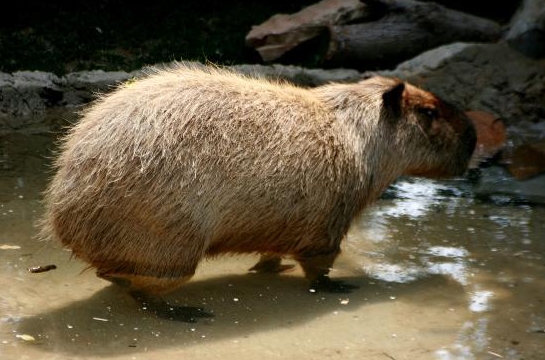
If you’ve ever seen a capybara in the wild, you know how big it is. And if you’ve ever seen one in captivity, then you know how funny they look with their large heads and small bodies. They’re also pretty quiet—a lot like dogs or cats!
But here’s something else that might surprise you: Capybaras are not as cute as they look! In fact, they are predators who will attack other animals if given the chance.
Do Capybaras Eat Their Poop?
Although capybaras are not dirty animals, it is surprising that these rodents eat their poop. Research has shown their capybara feces contain high protein content, thanks to the rich amount of microbes from the last meal they consumed.
Although their multi-chambered stomach eases the digestion of ingested food, capybaras derive more nutrients from consuming their feces.
Therefore, they can be called coprophagous animals, as they feed on their poop for its nutrients and health benefits.
Is Capybara Pool Dangerous?
Although capybara feces are incredibly important and beneficial to capybaras, it is known to contain zoonotic parasite (specifically the Neobalantidum coli and the Plagiorchis muris).
Moreover, scientific tests in Brazil revealed capybaras are carriers of the Vaccinia Virus (VACV). If you ever come in contact with a capybara or its poop, washing your hands with running water after contact is highly advised.
If you have an in-house pool for your kids or household, it is also advised to keep the pet rodent away from there as they can poop in there, which can be harmful to subsequent swimmers.
Conclusion
Capybaras are the cutest animals in the world, but they’re also surprisingly smart! These animals have a lot of interesting ways to stay safe and healthy, including their ability to poop in the water.
In addition, capybaras have developed a keen sense of smell that helps them keep track of other animals around them while staying hidden from predators who might want to eat them.

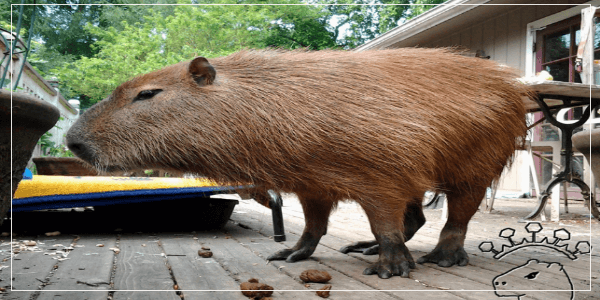
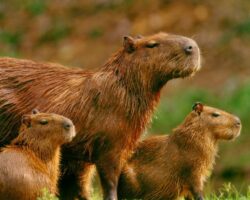

![Why Do Capybaras Not Have Tails? - [Answered] Why Do Capybaras Not Have Tails](https://capybaratips.com/wp-content/uploads/2023/03/Capy-Tail-250x200.webp)
